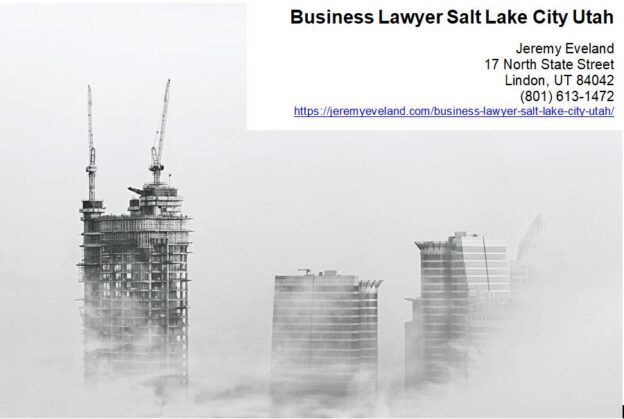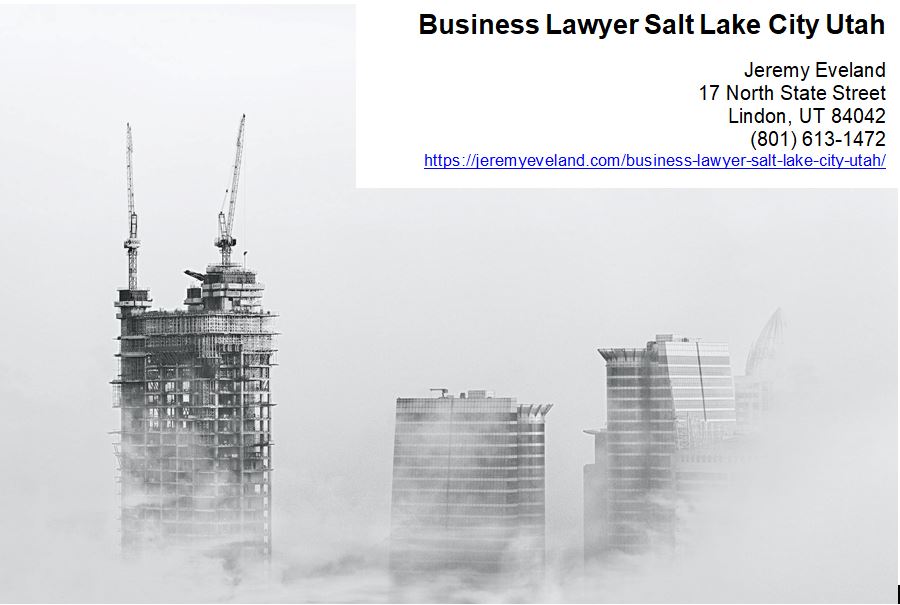Business Succession Lawyer Herriman Utah
Business succession is a process of transferring ownership and control of a business from one owner to another. It is important for businesses to have a succession plan in place, as it ensures continuity and a secure future for the business.
Succession planning begins with identifying and assessing potential successors. This involves looking at both internal and external candidates, and assessing their aptitude, skills, and experience to determine if they are suitable for the role. The business will also need to assess the financial implications of the succession.
Once a successor has been chosen, the business will need to develop a detailed plan for the transition. This includes outlining the roles, responsibilities, and expectations of the successor, and creating a timeline for the transfer of ownership.
In addition to the succession plan, the business will need to assess its legal and tax implications. This includes setting up a trust fund or other legal entity to hold the business assets, and ensuring that all taxes are paid.
The business will also need to consider the impact of the succession on its employees, customers, and stakeholders. This includes communicating the succession plan to those who will be affected, and putting measures in place to ensure that the transition is as smooth as possible.
Business succession is a complex process, but can be managed successfully with the right planning and preparation. A well-thought out succession plan will ensure that the business is in good hands, and will ensure its future success.
Business Succession Planning in Herriman Utah
Planning: Developing a comprehensive succession plan that takes into account the future needs of the business and its stakeholders. Planning is an essential part of any business succession, as it helps ensure that the transition of ownership, leadership, and management of the business is smooth and successful. Without proper planning, a business may face a number of challenges that can compromise its future sustainability, growth, and profitability.
At the outset, business owners should create a succession plan that clearly defines the ownership structure, the roles and responsibilities of each stakeholder, and the ownership and management transfer process. This plan should be regularly reviewed and updated to reflect any changes in the business’s structure, personnel, or operations. The plan should also consider the tax implications and legal requirements of the transfer.
Aside from ownership and management transfer, businesses should also plan for the financial needs of the business succession. A succession plan should include a detailed budget that considers the costs associated with the transfer of ownership, such as legal and accounting fees, transfer taxes, and other expenses. It should also include an analysis of the business’s current financial state and projections for future growth.
Business owners should also evaluate the succession plan’s effect on the business’s customer base, employees, and suppliers, as well as create a plan to ensure the effective communication of the transition to these stakeholders. Creating a smooth transition plan will help maintain customer trust and loyalty, as well as ensure that employees, suppliers, and other stakeholders are informed of the changes.
Finally, the business should have a plan for the future. This plan should include a vision for the future of the business, as well as strategies for achieving its desired objectives. It should also include an assessment of potential risks and an examination of the business’s competitive position in the industry.
Business succession planning is a complex process that requires careful consideration and strategic planning. By taking the time to create a comprehensive succession plan, business owners can ensure that their business is well-positioned for long-term success.
Financing a Business Succession
Financing: Securing the necessary funds to finance the succession. Financing is an essential part of business succession. It is the key to ensuring that the transition from one generation of business owners to the next is successful. Without proper financing, a business is likely to suffer from a lack of capital and liquidity, leading to decreased profits and a weakened competitive position in the marketplace. Financing also helps to ensure that the new ownership has the necessary resources to adequately manage the business and maintain a healthy financial position.
Financing gives business owners the ability to purchase assets that are necessary to the business’s success, such as new equipment, technology, and other resources. It also allows them to have access to working capital that can be used to hire additional personnel, purchase inventory, and make necessary investments in the business. For businesses that are transitioning from one generation of ownership to the next, financing can help to ensure that the successor has the necessary funds to continue operations.
Financing can also be used to help pay for the costs associated with business succession. These costs include settling any debts or obligations that are still owed to the prior generation of owners, as well as providing the necessary funds for the next generation of owners to purchase the business. Without proper financing, the new owners may not have the necessary resources to make the transition successful.
Financing is also important for providing the necessary capital to support the growth of the business. This includes providing the necessary funds to invest in new products or services, to expand into different markets, or to acquire additional resources. Without adequate financing, these types of investments may not be possible, leading to stagnation or even the failure of the business.
Finally, financing is essential to helping ensure that the new ownership can sustain the business in the long-term. This includes providing funds for the purchase of long-term assets, such as real estate, and for the development of new products or services. Without long-term financing, the business may not be able to compete effectively in the long run.
Transfer of Assets In Successions
The transfer of assets during business succession is a complex process that must be carefully planned and executed. Assets may include the business itself, real estate, investments, bank accounts, and intellectual property. Depending on the business structure, the transfer of assets may require the use of a corporate or legal entity such as an LLC, partnership, or corporation.
The transfer of assets begins with the business owner or their designated representative assessing the value of the assets. This includes determining the fair market value of each asset and making sure that all assets are properly documented. Once the value is determined, the business owner or their representative will need to decide how to transfer the assets. This could include a sale of the business, gifting of assets, or establishing a trust.
If the transfer is to be done through a sale, the business owner or their representative will need to create a sales agreement in which the buyer agrees to the terms of the sale. This agreement should include the price to be paid, the date the transfer will be completed, and the method of payment. To finalize the sale, the buyer and seller will need to register the transfer of assets with the appropriate governmental agencies.
If the transfer is being done through gifting, the business owner or their representative will need to create a gifting agreement in which the recipient agrees to the terms of the gift. This agreement should include the value of the gift, the date the transfer will be completed, and any restrictions or requirements the recipient must abide by. The agreement must also be registered with the appropriate governmental agencies.
Finally, if the transfer is being done through a trust, the business owner or their representative will need to create a trust agreement. This agreement should include the terms of the trust, such as who the beneficiary is, the type of trust being established, and the date the transfer will be completed. Depending on the type of trust, the trust agreement may need to be registered with the appropriate governmental agency.
Overall, the transfer of assets during business succession is a complex process that requires careful planning and execution. By understanding the value of the assets, the method of transfer, and the necessary paperwork, the business owner or their representative can ensure that the transfer of assets is done properly and that the business is passed on to the intended recipient.
Business Succession Transition Management
Transition Management: Ensuring a smooth transition from the current owner to the successor. Transition management is an important part of business succession planning. It is the process of successfully transferring the ownership, management and operations of a business from one generation to the next. It is a complex process that involves understanding the business, its goals and objectives, the current leadership and management structure, the transfer of ownership, and the transition of control of the business from the current owners to the next generation.
Transition management requires a thorough understanding of the current state of the business and its environment, as well as a plan for the future. The current owners must have a clear understanding of their role in the transition and what they will be leaving behind. This includes an understanding of the current financial state of the business, the current organizational structure, the current legal structure, the current markets, the current customers, and the current competition.
The business succession plan should also include a strategy for the future of the business. This plan should include an analysis of the current business environment, the future markets and customers, the legal requirements for transitioning the business, the financial implications of the transition, and the strategy for transferring ownership, management and operations of the business.
The transition management process also involves the selection of a new owner and the negotiation of a transfer agreement. This agreement should include the transfer of ownership, the transfer of management and operations, the terms of the transfer, and the terms of the agreement. It should also include provisions for the payment of taxes, the transfer of assets, the transfer of liabilities, and the transfers of intellectual property rights.
It is important for the current owners to develop a clear understanding of the transition process and to ensure that all legal and financial requirements are met. It is also important to ensure that the transition is smooth and successful. By taking the time to plan and prepare for the transition, the current owners can ensure that the future of the business is secure and successful.
Support From Your Business Succession Lawyer in Herriman Utah
Support: Providing the necessary advice, guidance and support to ensure the success of the succession. Business succession is an important part of any business, particularly when a business is passed from one generation to the next. It involves a complex process of transferring ownership, assets, and liabilities from one generation to the next. It is a critical process that can have significant implications for the future of the business, as well as the future of the family. As such, it is important to ensure that the succession process is managed properly, and with the utmost care.
One of the most important aspects of a successful business succession is the involvement of a lawyer. A lawyer can provide valuable insight into the legal and financial aspects of the process, and can ensure that the transition is conducted in accordance with all applicable laws and regulations. A lawyer can also provide guidance in the development of an estate plan, which is essential for protecting the family’s assets and minimizing taxes. A lawyer can help to ensure that the transfer of ownership is done in an orderly and efficient manner, and in accordance with the wishes of the family.
In addition, a lawyer can provide advice on the structure of the business and the best way to transfer ownership and assets. A lawyer can also provide advice on the proper way to handle any disputes that may arise during the succession process. Furthermore, a lawyer can provide guidance on any tax implications associated with the succession, and can help to ensure that all required documents are properly prepared and filed.
Finally, a lawyer can provide invaluable advice and guidance throughout the entire succession process. This can help to ensure that the transition is smooth and successful, and that the family’s interests are adequately protected. Without the assistance of a lawyer, it is much more likely that the process will be complicated and potentially costly.
In conclusion, the support of a lawyer is essential as part of a business succession. A lawyer can provide invaluable guidance and advice throughout the entire process, and can help to ensure that the succession is conducted in accordance with all applicable laws and regulations. Through the assistance of a lawyer, the succession process can be completed quickly and efficiently, and the family’s interests can be adequately protected.
Business Succession Lawyer Herriman Utah Consultation
When you need legal help from a Business Succession Lawyer in Herrimann Utah, call Jeremy D. Eveland, MBA, JD (801) 613-1472 for a consultation.
Jeremy Eveland
17 North State Street
Lindon UT 84042
(801) 613-1472
Recent Posts
The Utah Uniform Partnership Act
The 10 Essential Elements of Business Succession Planning
Business Succession Lawyer Taylorsville Utah
Business Succession Lawyer South Jordan Utah
Business Succession Lawyer Lehi Utah
Business Succession Lawyer Millcreek Utah
Business Lawyer Salt Lake City Utah
Business Transaction Lawyer Salt Lake City Utah
Business Succession Lawyer Herriman Utah
Herriman, Utah
|
Herriman, Utah
|
|
|---|---|

Unified Fire Authority Station 103, located on Main Street
|
|

Location in Salt Lake County and the state of Utah.
|
|
| Coordinates: 40°30′24″N 112°1′51″WCoordinates: 40°30′24″N 112°1′51″W | |
| Country | United States |
| State | Utah |
| County | Salt Lake |
| Settled | 1851 |
| Incorporated | 1999 |
| Became a city | April 19, 2001 |
| Founded by | Thomas Butterfield |
| Named for | Henry Harriman |
| Government
|
|
| • Type | Mayor-Council |
| • Mayor | Lorin Palmer[2] |
| Area | |
| • Total | 21.63 sq mi (56.03 km2) |
| • Land | 21.63 sq mi (56.03 km2) |
| • Water | 0.00 sq mi (0.00 km2) |
| Elevation
|
5,000 ft (1,524 m) |
| Population
(2020)
|
|
| • Total | 55,144[1] |
| • Density | 2,549.42/sq mi (984.19/km2) |
| Time zone | UTC-7 (Mountain) |
| • Summer (DST) | UTC-6 (Mountain) |
| ZIP code |
84096
|
| Area code(s) | 385, 801 |
| FIPS code | 49-34970[4] |
| GNIS feature ID | 1428675[5] |
| Website | http://www.herriman.org |
Herriman (/ˈhɛrɪmən/ HERR-ih-mən) is a city in southwestern Salt Lake County, Utah. The population was 55,144 as of the 2020 census.[1] Although Herriman was a town in 2000,[4] it has since been classified as a fourth-class city by state law.[6] The city has experienced rapid growth since incorporation in 1999, as its population was just 1,523 at the 2000 census.[7] It grew from being the 111th-largest incorporated place in Utah in 2000 to the 14th-largest in 2020.
About Herriman, Utah
Herriman is a city in southwestern Salt Lake County, Utah. The population was 55,144 as of the 2020 census. Although Herriman was a town in 2000, it has since been classified as a fourth-class city by state law. The city has experienced rapid growth since incorporation in 1999, as its population was just 1,523 at the 2000 census. It grew from being the 111th-largest incorporated place in Utah in 2000 to the 14th-largest in 2020.
Neighborhoods in Herriman, Utah
Herriman Towne Center, Rosecrest, Sunstone Village, Walmart Neighborhood Market, Daybreak, Heritage Place Park, Jackson by Richmond American Homes, Jackson - Wright Homes, The Cove at Herriman Springs, Indian Pony Park, Herriman City Community Garden, W & M Butterfield Park, Brundisi Towns, Teton Village, Ivory Homes - Juniper Estates, Sunset Pointe by Richmond American Homes, Teton Ranch by Richmond American Homes, Herriman Towne Center, Perry Homes - Hidden Oaks, Solameer Townhomes
















